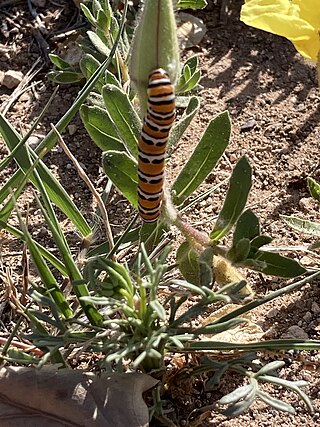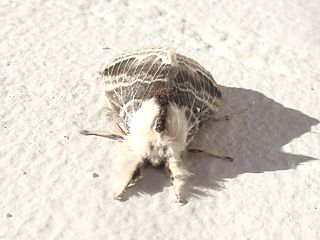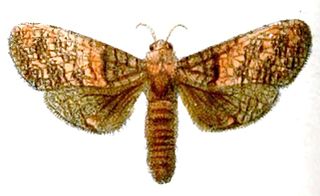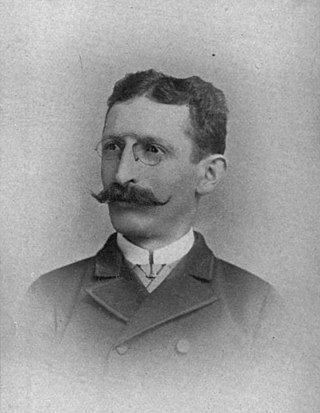
Gastropachinae is a subfamily of the moth family Lasiocampidae. It was first described by Berthold Neumoegen and Harrison Gray Dyar Jr. 1894.

Lophocampa is a genus of moths in the family Erebidae. The genus was erected by Thaddeus William Harris in 1841. It contains around 75 species.

Pygarctia is a genus of moths in the family Erebidae.

Eupseudomorpha is a monotypic moth genus of the family Noctuidae erected by Harrison Gray Dyar Jr. in 1893. Its only species, Eupseudomorpha brillians, was first described by Berthold Neumoegen in 1880. It is found in portions of New Mexico, Texas, and Oklahoma, in the Western Short Grasslands and Central and Southern Mixed Grasslands ecoregions. Caterpillars of the species appear to use members of the Onagraceae, particularly Oenothera as a food source.
Edwardsimemna is a monotypic moth genus in the family Lasiocampidae erected by Berthold Neumoegen and Harrison Gray Dyar Jr. in 1894. Its single species, Edwardsimemna jalapae, described by Henry Edwards in 1884, is found in Mexico.

Tolype is a genus of moths in the family Lasiocampidae. The genus was erected by Jacob Hübner in 1820.

Clostera is a genus of moths of the family Notodontidae. It consists of the following species:

Harrison Gray Dyar Jr. was an American entomologist. Dyar's Law, a pattern of geometric progression in the growth of insect parts, is named after him. He was also noted for eccentric pursuits which included digging tunnels under his home. He had a complicated personal life and along with his second wife he adopted the Baháʼí Faith.

Hemileuca is a genus of moths in the family Saturniidae first described by Francis Walker in 1855.
Agapema is a subgenus of moths under the genus Saturnia, in the family Saturniidae. Agapema was first described by Berthold Neumoegen and Harrison Gray Dyar Jr. in 1894.
Gazoryctra roseicaput is a moth of the family Hepialidae. It was described by Berthold Neumoegen and Harrison Gray Dyar Jr. in 1893. It is known from the mountains of western North America, including Washington, Oregon, British Columbia and Alberta.
Arachnis citra is a moth of the family Erebidae. It was described by Berthold Neumögen and Harrison Gray Dyar Jr. in 1893. It is found in North America, including Arizona, California, Colorado and Utah.

Pygarctia roseicapitis, the red-headed pygarctia moth, is a moth in the family Erebidae. It was described by Berthold Neumoegen and Harrison Gray Dyar Jr. in 1893. It is found in Mexico and in the United States from southern Arizona to Texas.
Spilosoma danbyi, or Danby's tiger moth, is a moth in the family Erebidae. It was described by Berthold Neumoegen and Harrison Gray Dyar Jr. in 1893. It is found in North America, where it has been recorded from Washington and western Canada from British Columbia to Manitoba.
Givira is a genus of moths in the family Cossidae.

Hypopta is a genus of moths in the family Cossidae.
Dalcerides is a genus of moths of the family Dalceridae. It was described by Berthold Neumoegen and Harrison Gray Dyar Jr. in 1893.
Furcula nivea is a moth in the family Notodontidae. It was first described by Berthold Neumoegen in 1891 and it is found in North America.

John Bernhardt Smith was an American professor of entomology who specialized in systematics and economic entomology while also serving as the State Entomologist of New Jersey. Smith is remembered in insect taxonomy for the conflict that he had with Harrison Dyar.

Berthold Neumoegen was a German-born American stock-market investor and amateur entomologist who specialized in the Lepidoptera.
This page is based on this
Wikipedia article Text is available under the
CC BY-SA 4.0 license; additional terms may apply.
Images, videos and audio are available under their respective licenses.











